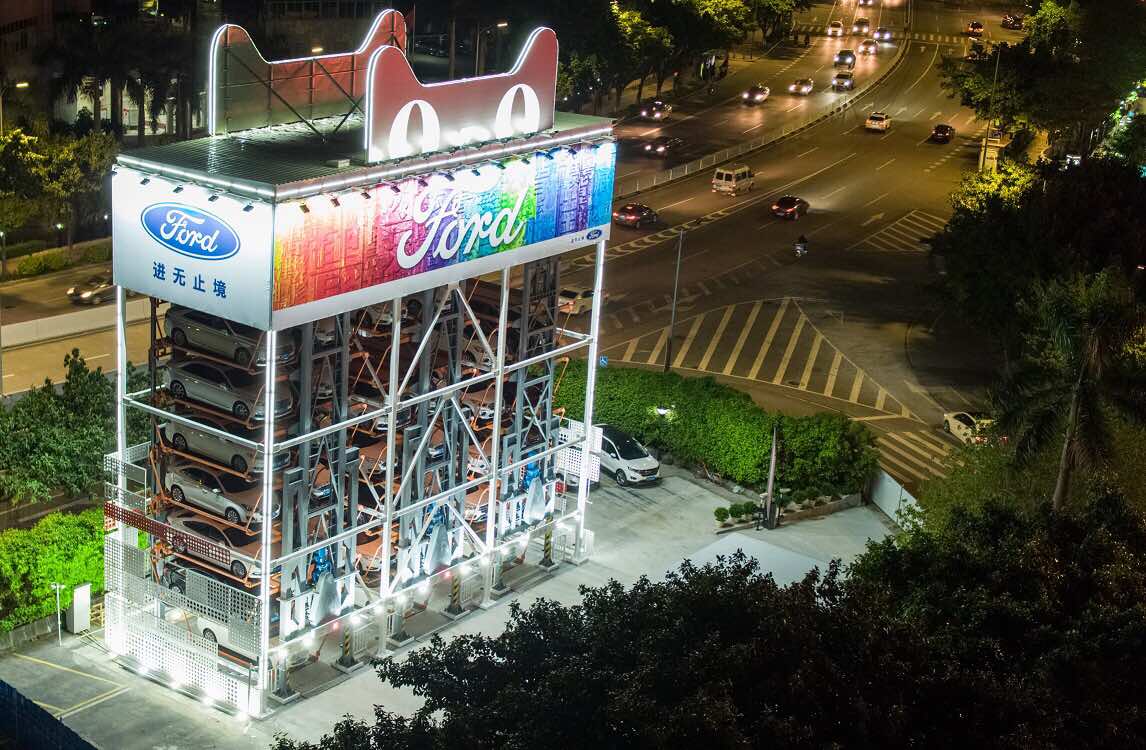
Tmall on Monday unveiled China’s first “auto vending machine,” partnering with American carmaker Ford Motor for the first phase of a larger push to upgrade the test-drive experience for Chinese consumers.
The “Super Test-Drive Center,” in Guangzhou, offers three-day test-drives to potential buyers researching their next purchase, allowing them to choose from more than 100 vehicles, including the Explorer SUV, Mustang, Edge and Everest models.
“We are looking for ways to simplify customers’ lives and give them the ultimate try-before-you-buy experience,” said Dean Stoneley, vice president of marketing at Ford Asia Pacific, at a launch event.
The launch is the pilot collaboration between Alibaba Group, which owns Tmall, and Ford since they announced a partnership last December. They plan to leverage artificial intelligence, cloud computing, the Internet of Things and e-commerce to “redefine the consumer journey and user experience for automobiles,” the companies said.
Other than picking up and driving the test car, the entire experience plays out through Alibaba’s mobile e-commerce apps. Users find Tmall’s “Super Test-Drive” page, browse the available models and then choose a time for pick-up. They also snap a selfie with the mobile app, which is used to confirm their booking at the test-drive center. Test-drives cost RMB 99 ($16) or RMB 198, depending on the model. But Alibaba Super Members, or customers with a Zhima Credit score over 700, get their rides for free.
WATCH: Test-Drive Tmall’s New Car Vending Machine
The car vending machine is the latest development in a larger push for New Retail by Alibaba, said Gu Wanguo, general manager of vehicles at Tmall Auto. The New Retail model focuses on user experiences, he said, and access to services such as the test-drive center will provide a better understanding of particular vehicles while making car shopping more fun and engaging.
In addition, Alibaba’s analytics and marketing resources can be leveraged to help brands and distributors better identify potential car shoppers and their demands, Gu said. Alibaba will release the vending machine’s technology to the entire industry so that they can build stronger connections with consumers and support their distributors “in hopes of helping upgrade the automotive sector as a whole,” he said.
Cao Zhenyu, a senior executive at Changan Ford Automobile, a Ford joint venture headquartered in Chongqing, said that test-driving a car is critical to the shopping experience. However, traditional test-drives offered by dealerships are often limited by time, space and available routes.
“If we lengthen the duration of test-drives, consumers can make buying decisions with more confidence and ease,” Cao said. “We want consumers to take our cars out traveling and on their daily commutes for them to fully experience our products, and eventually have that translate to sales at our physical stores.”
Ford’s Stoneley echoed those sentiments, saying the online-to-offline initiative with Tmall was a targeted strategy to drive foot traffic to the company’s showrooms in China. “It’s about having them try Ford vehicles, and ultimately buying the vehicle at a Ford dealership,” he said.
China has been the world’s largest auto market since 2009. While sales growth last year slowed considerably to 3% year-on-year from the 13.6% seen in 2016, carmakers in the U.S. and Europe have been shifting strategies to attract consumers in a country that still accounts for 30% of total global car sales. Partnerships with Tmall have been among those strategies, including companies such as Maserati, Alfa Romeoand BMW.
Ford is Tmall’s exclusive partner for the first phase of the vending machine’s launch. Other partners have yet to be announced, but Alibaba is eyeingBeijing and Hangzhou as possible locations for the next phase.




